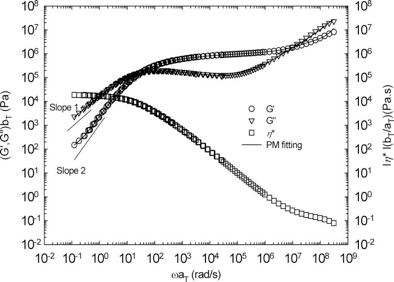
“Solution and melt viscoelastic properties of controlled microstructure poly(lactide)”
A series of controlled microstructure poly(lactide) (PLA) samples were synthesized using a novel chiral dinuclear indium catalyst capable of living polymerization of lactide. PLAs with different ratios of L- to D- monomer ratios of 100:0, 90:10, 75:25, 50:50, and 0:100 were investigated. The relationship between intrinsic viscosity and the absolute molar mass distribution of the samples obtained by light scattering gel permeation chromatography in tetrahydrofuran gives [η] = 0.014 + 0.75 Mw, a scaling law of typical coil dimensions of linear macromolecules in good solvent. The melt rheological study includes determination of zero-shear viscosity and its relationship with the molecular weight, the relaxation spectrum, and its relation with molecular weight characteristics, as well as plateau modulus and other important rheological parameters that are helpful in predicting the linear viscoelasticity of PLA. Emphasis is placed on the uniaxial melt behavior of these polymers. At low temperatures, significant strain hardening is observed, which gradually disappears with an increase in temperature and decrease of Hencky strain rate. The K-BKZ constitutive equation is used to model the experimental data. It is concluded that in spite of their linear structure, PLAs exhibit strain hardening which is not due to strain-induced crystallization, and it is solely due to the dynamics of molecular relaxation.